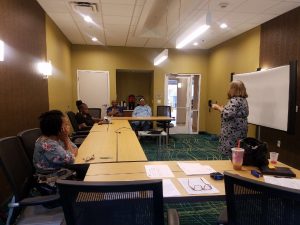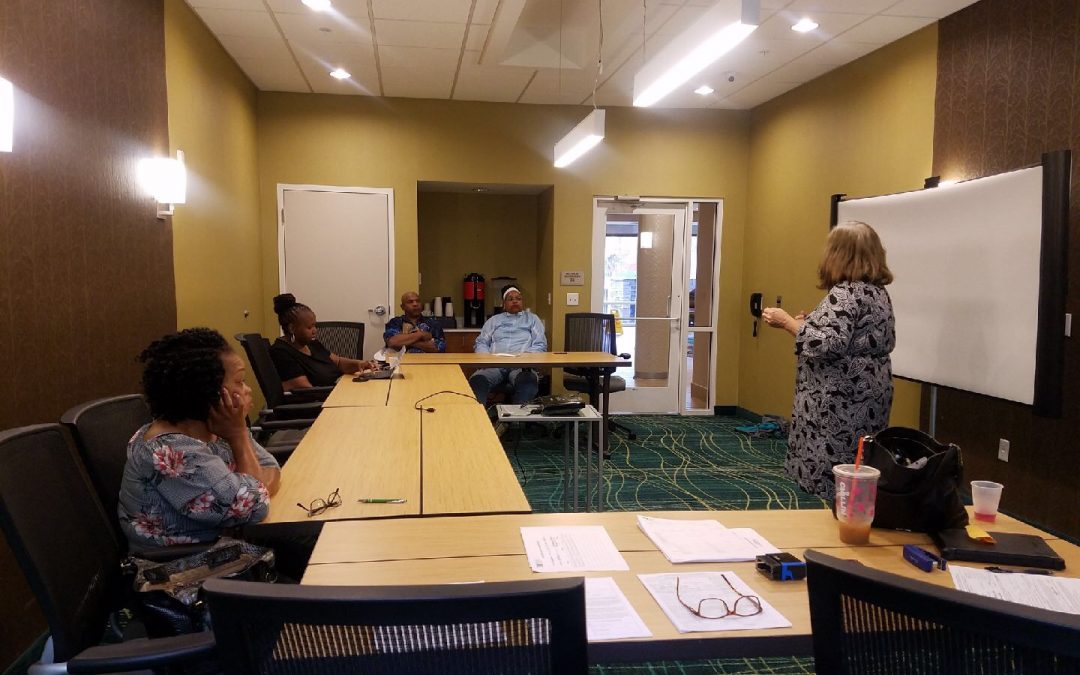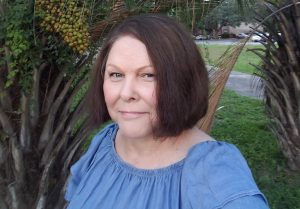By Shay Stinson
Edited by Intisar Seraaj
The traditional office environment has changed as rapidly as technology has changed. The brick-and-mortar office environment has evolved into having an employee’s complete office needs in the palm of their hands (i.e. cellphones, laptops, etc.). Seraaj Family Homes, Inc.’s (SFH) Mobile, Alabama region has established itself as a model for remote and virtual working. Read the interview between SFH licensing social worker Ellen Brewer and Shay Stinson, SFH junior content creator, to learn the effects and benefits of working remotely.
Q. Tell me a little bit about yourself. What is your role at Seraaj Family Homes, Inc. (SFH) and what’s your professional background?
A. My name is Ellen Brewer. I’ve been with Seraaj Family Homes, Inc. for 3.5 years as a licensing social worker. I’ve have been working in the Mobile, Alabama virtual region this entire time. Prior to coming to SFH, I had about 10.5 years of experience with the Department of Human Resources (DHR) and I’ve [earned] some time with another foster care agency. I’ve been in social work since Jan. 3, 1989 [and have] worked in mental health facilities.
Q. Are you from the region you work in?
A. [Actually] I am not from Mobile. I moved down here with a job with DHR in 1991. I’m from [a city] close to Birmingham. I spent the majority of my growing up years around Talladega County, [Alabama]. I call Sylacauga, [Alabama] home. My mother is from Anniston, [Alabama], my brother went to college in Birmingham and played football, and so I’ve been all over the place.
Q. What type of experience has working remotely given you? What lessons have you learned?
A. One of the first lessons I learned was to always contact appointments before I go so that they remember me and they’re expecting me. I have learned about using my devices and equipment in the field. I have worked in the car. I can work anywhere now. It doesn’t matter where I am. I’ve learned how to work from each device and to pull up what I need. I have learned things like when I need to take a printer or only a scanner or [complete work] via phone and getting updated paperwork [turned] in [via] the cloud.
Q. Prior to this, what would you say your level of experience is with completing work with devices and apps?
A. It wasn’t great or a lot because when I worked with other agencies it wasn’t so virtual in using your devices on the job. [Other agencies] did not require us to do that and they did not even want us to use apps on our phones. They didn’t have a cloud system for us to put documents into. Although we asked for different productivity apps, they wouldn’t allow it. I was kind of squelched in that way, not because I didn’t want to learn it, but because we weren’t allowed.
Q. And when you started working for SFH, you wanted to make sure you were doing the right thing?
A. Exactly! I wanted and I loved the idea of being able to use the apps and devices to make my work more efficient and productive, and I feel like it has done that. It used to be that I would have to go back to the office and do all the paperwork and input everything and now I don’t always have to do that. I may have moments when I need to do that for some reason but being able to use those apps has been incredible!
Q. That speaks volumes to the advice you may have to offer to someone that might not be acclimated with using apps and devices in this way. What would you say to them?
A. I had to learn when I started. I wanted to learn. You have to want to [learn].

Pictured: Ellen Brewer conducting orientation. Photo by Lebarbara Stinson.
Ellen’s Advice On Tackling Remote Work
Q. What qualities or pre-requisites do you think an employee should have to work remotely?
A. I believe, number one, they would need to be very organized. If they’re not a very organized person and they don’t learn to be organized and try to increase their organizational skills, it’s not going to be an easy job. I can’t see that they would be successful at it. If they are not a really organized person, but they [are] open and build those great organizational skills, then they will be OK. Another thing is their work ethic. They really need a strong work ethic: the kind of person that doesn’t have to have someone looking over their shoulder constantly to make sure they’re doing their work. Because you’re able to make your own schedule, so their work ethic must be strong. I think that is very important.
Q. What do you like most and least about remote work?
A. I feel like I don’t have as many distractions. I can make my own schedule with the people I have to have appointments with. I have the flexibility to make those appointments anytime they’re needed. I love working with people. I think the things I probably miss the most are interactions with coworkers in an office. Not saying that I would want to go back to that because that can be a distraction. I interact with my coworkers often [via apps and tech]. We sometimes talk about cases or making plans for events. I don’t see people daily, but I have adjusted quite well to that because I don’t have as many distractions.
Q. Do you think mobile workers need time to have face–to–face contact, outside of working directly with clients? Like team-building exercises?
A. I think it would be good, every so often. We are all very busy working with our parents and children. You wouldn’t want to overwhelm people by getting together every week or something, but I think it would help to make it a little more cohesive. Maybe to have a meal together occasionally would be helpful.
Q. There are studies that say remote workers are increasingly more productive than in-house employees. Would you agree or disagree and why?
A. I completely agree, and it goes back to the distractions. Sometimes coworkers are a distraction. You may start a conversation that starts with work and goes on to something else. Just the noise level in an office is distracting. When I worked in an office, I would get the most done when no one was there. It was silent. It allowed me to focus better and be more productive.
Q. Do you think in–house employees should have an opportunity to experience what it’s like to spend the day with a remote worker?
A. That would be great. When I go to train new social workers, I do that. I take the lead in that region and plan out what we’re doing that day. We sit down and discuss how I conduct my day virtually, and how I set up files on the computer and send the paperwork to the corporate office. I think it is helpful to shadow a remote worker.
Work/Life Balance
Q. Does remote work assist with your work/life balance? If so, how?
A. Well, I’m almost a workaholic. But when I have personal things to do like doctors‘ appointments, I try to schedule [around] those things so I can get my 8 hours [of work] in. It’s helpful so I don’t have to take time off. It cuts down on sick leave. It crosses my mind that not being in an office with other people [keeps you from getting] sick as often.
Q. The CEO speaks about the mobile employee and how it translates into our work. How do you feel like remote working helps your duties at SFH? Does it hurt your work at all? Is there room for improvement?
A. I would say yes it helps. Maybe because of fewer distractions. I can focus on each home individually. It has made me a better social worker.
Q. What regions and areas have you traveled to or worked in with SFH?
A. To be honest, I haven’t been to Baltimore. I try to go where needed. I am an empty nester. I have three small pets that are cared for when I’m gone. I try to help when I’m needed. I love to teach and share what I do know. I want to help make our new licensing social workers successful. I want to give them my tips and help them learn the way Seraaj does things so they will be successful. I don’t mind traveling; I don’t mind doing it.
Q. So would you say that traveling is a benefit or perk of a remote worker’s job?
A. For me, yes. Some people don’t like to travel, but I do. It’s kind of a perk to be able to go work in other areas.
Q. What would you like to add to our conversation about remote work?
A. SFH has been my favorite social work job I’ve had. It’s been occasionally tough. Crises happen sometimes and it’s stressful. It’s not nearly as stressful as other places I’ve worked. It has a lot to do with how the CEO handles things and how he encourages people. He’s been encouraging from the beginning and I just love my job! In the past, I have been burned out at other places. I know what that’s like and why now I can say I don’t feel burned. I love my job!


